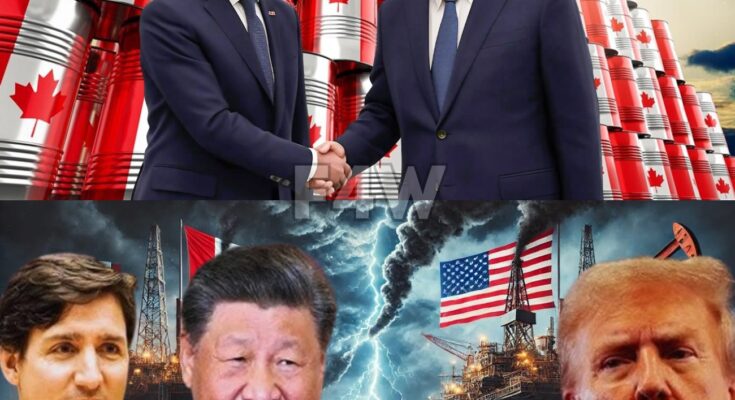In a stunning geopolitical maneuver, China and Canada have recently forged an oil pact that is sending shockwaves through the energy sector and leaving the United States grappling with its implications. This unexpected alliance not only underscores the shifting dynamics of global energy politics but also raises questions about the future of electric vehicles (EVs) and the broader energy wars that are heating up on the world stage.

At the heart of this pact is a strategic partnership that allows China to secure a stable oil supply from Canada, a country rich in natural resources and known for its vast oil sands. This agreement comes at a time when the world is transitioning towards greener energy solutions, yet the demand for oil remains robust, particularly in developing economies. China, with its growing appetite for energy to fuel its industrial expansion, views Canada as a crucial ally in ensuring energy security. In exchange, Canada stands to benefit from significant investments and technological advancements that China brings to the table.
The implications of this pact are profound, especially for the United States. Historically, the U.S. has been a dominant player in the North American energy landscape, relying heavily on both its own resources and those of its neighbors. However, as China and Canada deepen their ties, the U.S. risks being sidelined in a rapidly evolving energy market. This shift could potentially undermine American energy independence and influence, especially as the U.S. grapples with its own energy policies and the push towards EVs.

Moreover, the pact raises serious questions about the future of electric vehicles. The U.S. has positioned itself as a leader in EV technology, aiming to reduce its reliance on fossil fuels. However, with China’s aggressive investments in both oil and EV technology, it is poised to become a formidable competitor in the global market. The interplay between oil dependency and the transition to EVs creates a contentious debate: can nations truly commit to sustainable energy solutions while still relying heavily on fossil fuels? Critics argue that partnerships like the one between China and Canada could hinder progress towards a greener future, as they perpetuate an oil-dependent economy.
This energy war is further complicated by the global political landscape. The U.S. has often used its energy resources as a tool of diplomacy, leveraging its position to influence other nations. However, as China and Canada strengthen their relationship, the balance of power may shift, making it more challenging for the U.S. to exert its influence. This scenario poses a dilemma for American policymakers: should the focus remain on advancing EV technologies, or should there be a renewed emphasis on securing traditional energy sources to maintain geopolitical standing?

The reactions to this pact have been mixed. Supporters argue that it represents a pragmatic approach to energy security, acknowledging the continued importance of oil in the global economy. Detractors, however, view it as a step backward, undermining efforts to combat climate change and invest in sustainable practices. The debate is likely to intensify as other nations observe this alliance, potentially leading to a ripple effect in global energy alignments.
In conclusion, the oil pact between China and Canada not only signifies a shift in energy dynamics but also encapsulates the complexities of navigating an energy transition in a world still heavily reliant on fossil fuels. As the U.S. contemplates its next steps, the broader implications of this partnership will continue to unfold, forcing nations to confront the delicate balance between securing energy needs and pursuing a sustainable future. The energy wars are indeed heating up, and the outcome remains uncertain as global players recalibrate their strategies in this new landscape.

